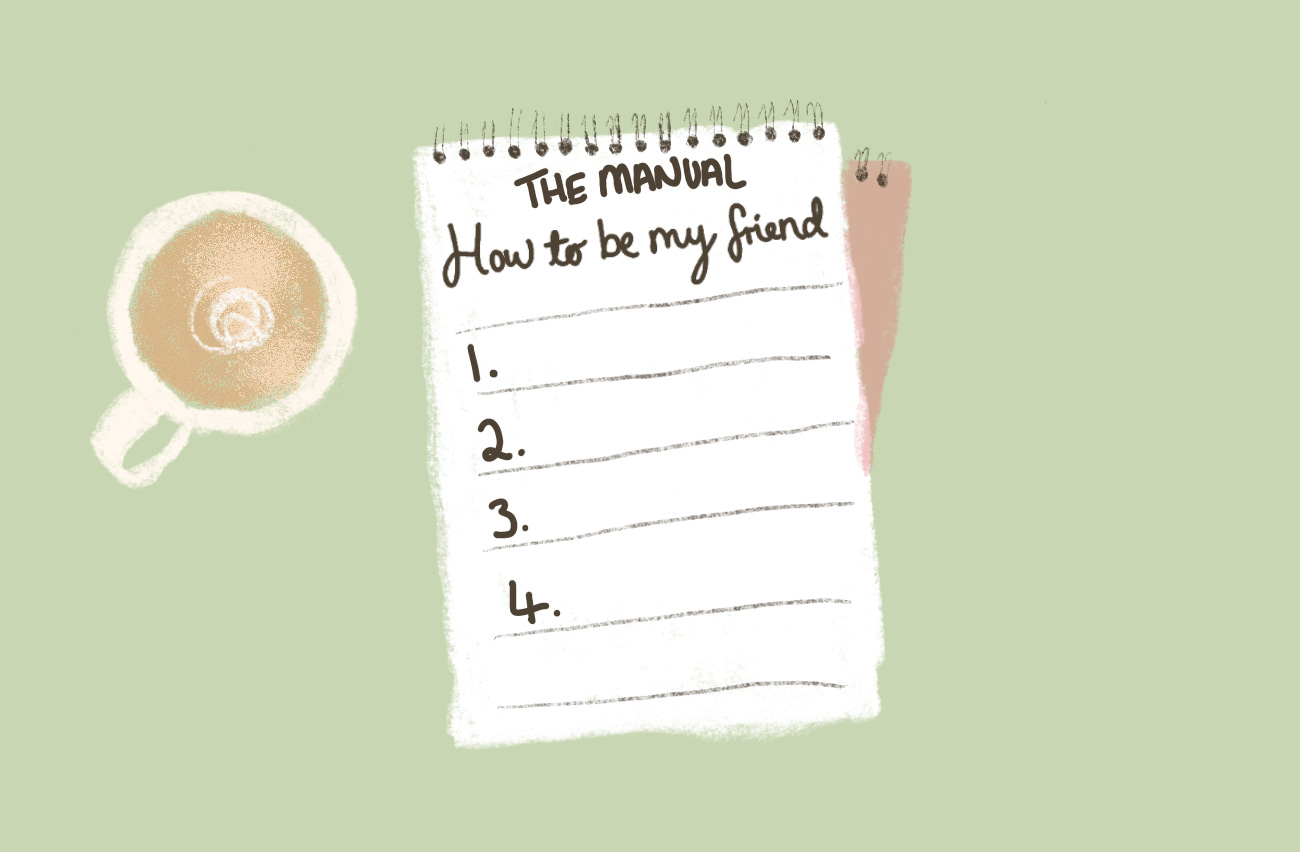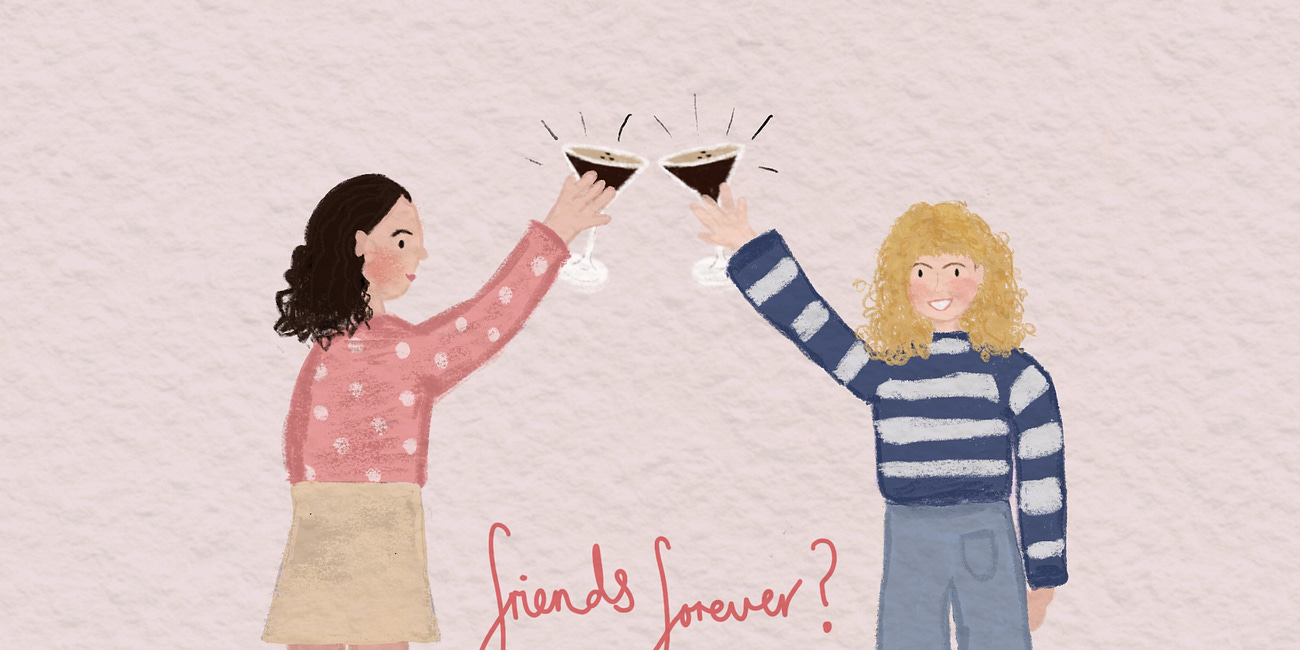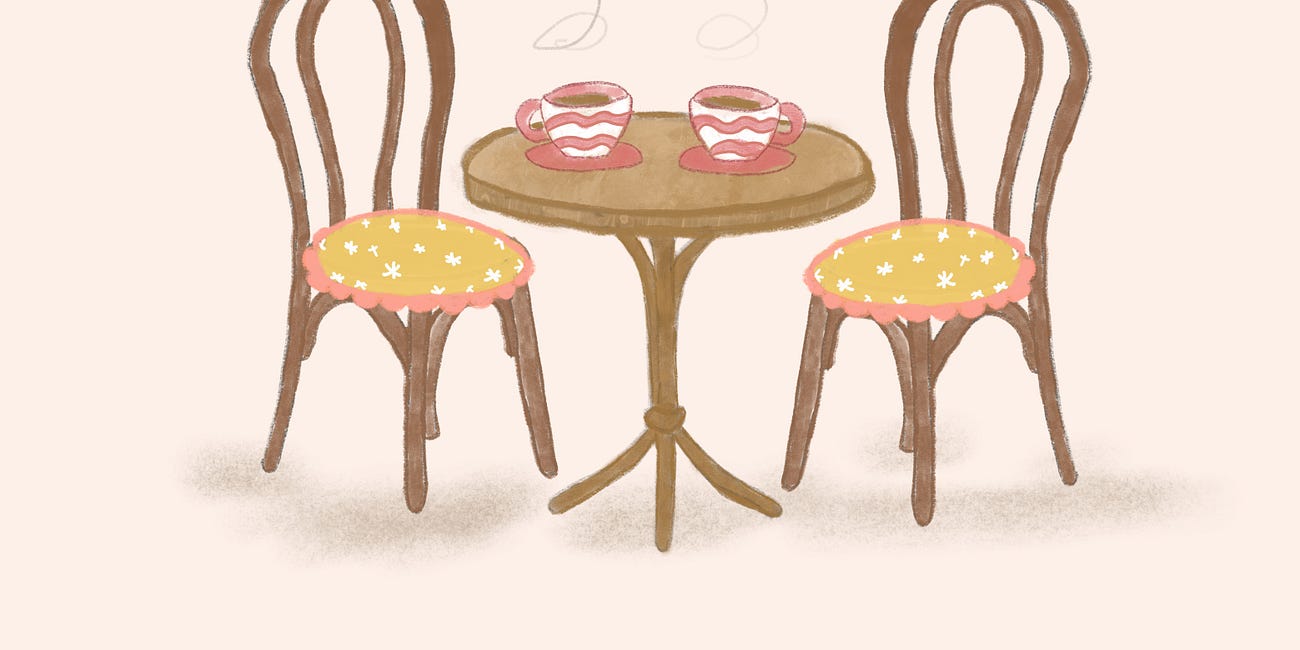The Friendship Manual We’re All Too Afraid To Write
On friendship manuals, mismatched expectations, and why we don't just say what we need
The other week, I said no to an extended weekend with friends. My husband immediately offered to make up an excuse for us.
“Why can’t I just say sorry, that’s not my cup of tea?” I sighed.
They wanted us to stay an extra night, Friday-Sunday and a full weekend. I knew I could give my ‘all’ for a day, but if we didn’t get home until Sunday afternoon, I’d be absolutely drained. And I’m self-aware enough to know that for me, rest and reset time (alone, without social interaction) isn’t optional. It’s survival.
He thought it best to make an excuse, I wanted to tell the truth. Both options were viable, but his was the easier, and the least likely to cause offence.
We went with the excuse.
But something about it bugged me. Why did honesty feel so awkward, when it was just about how I recharge?
And then it hit me: what if there were a way to make this easier? A way for people to understand us upfront? What if we actually gave people a manual on how to be our friend?
Something that sets expectations upfront.
I know what you’re thinking – that sounds soooo boring, right? A manual!
But hear me out.
I’ve heard of them being used in workplaces, a “How to Work With Me” guide, where people include things like how they communicate, their strengths, motivations, watch-outs, and teams actually start working with each other’s individual differences, not against them.
And there’s a reason why these exist.. because they do actually help improve things.
So, why not in friendships?
I’m fully aware this would be a bit ridiculous. How would we even format them? Would it be printed? A digital file? Maybe even a slideshow?!
But the more I think about it, the more I realise: most of the conflict in my friendships hasn’t been malicious, or about having different personalities or needs. It’s been about mismatched expectations, miscommunication, and literally just not understanding each other.
We assume that people know our needs when we haven’t actually expressed them. We expect to be completely known and understood as individuals, without even offering the blueprint.
So why not try to set expectations upfront?
When you actually acknowledge a difference in needs
Sometimes you meet someone who instinctively gets it. Who doesn’t need the manual because they’ve already learned how you work.
Like a friend of mine, who once said something that genuinely surprised me.
A while ago, I was chatting to him about a post-work dinner, and the said the following:
“Let’s do Tuesday and we can do the new Thai place you wanted to try. I know you like your expectations to be managed.”
To many, this might seem like a normal person agreeing to a normal plan.
But this friend was the spontaneous type. Very low commitment. Someone who is exceptionally good at ‘going with the flow’ but hard to pin down with a plan.
I have to say that I tended to be the complete opposite.
And I’d get frustrated because he wouldn’t commit to anything and he’d get frustrated because he thought I was obsessed with having too rigid a plan.
He thought I was obsessed with control; I thought he had a fear of commitment.
We both saw each other in extremes sometimes, and that’s when we clashed.
When he changed plans last minute, he thought nothing of it. I saw it as disrespectful.
We were very different, in that respect. And because of that, it took extra work to even attempt to understand each other.
But we did, and that’s why I appreciated (and was very shocked) by the fact that in that moment, he was trying to do the very thing I needed — give me a bit of commitment.
A loose example perhaps, but it reminded me of how great friendships can be when you take the time to understand the other person better. When you try to meet them, to compromise.
There were many occasions when I spontaneously agreed to something in response, so it wasn’t one-sided.
Why We Don’t Just Say What We Need
That moment really stuck with me — how small acts of understanding can make such a difference.
But here’s the thing: we don’t always get there. Most of us never actually say what we need. Not because we don’t want to, but because it feels... wrong somehow. Like we’re asking too much.
If we decline a party invite because actually, we hate parties and would rather see that person one-on-one, we shouldn’t have to explain, and I probably shouldn’t be writing an essay about it (but alas, here I am you lucky things!)
But that’s only true once we’ve done the initial explaining.
When we share context upfront, it builds empathy. It gives someone a chance to understand us. It helps others know it’s not personal—it’s about our wiring, our limits, our ways of being.
And, it saves ongoing laborious explanations.
The problem is often language. Not knowing how to say something.
Our brains go “how the heck do I communicate this without offending someone?” and then we just.. don’t communicate it.
When I was in my early twenties, I had a mini argument with a friend about what time we’d get the train back from a weekend away. She was pushing for a 3pm Sunday train, meaning we wouldn’t be back to London and in our house until 6pm. I spiralled, panicking about my lack of Sunday rest and how I’d be so mentally exhausted for the week. I wanted to spend time with that friend, but not that much.
But I didn’t know how to say: that’s too much for me.I didn’t know that was even allowed.
Another friend used to cancel on the day of any slightly bigger event I invited her to. Every single time, it was “I’m ill.”
It drove me mad! Not because I was offended, but because I wished she’d just said, “I don’t enjoy those kinds of things, I’d rather see you in a smaller group.”
I get that it’s hard to know the right way to say something that has the potential to offend. But I’d love it if we tried a bit more.
Sometimes I feel so frickin’ guilty for getting drained. For being overstimulated.
And I’m confusing, even to myself — a weird mix of extrovert and introvert, and easily overstimulated.
I love people, but too much social time fries my brain. In new settings I get anxious. I blink too much. I used to drink too much.
But as soon as I feel comfortable I am Chatty McChatty.
So yes, I’m a people person. But I also burn out easily. And I never quite know how to explain that.
Explaining ourselves is hard. But maybe it would be easier if we had a template?
What Would Go In a Friendship Profile?
“But what should we put in this profile”, I hear you all collectively ask.
Well, allow me to tell you in the form of my own mini profile that I literally just wrote as I was doing this piece.
1. How I communicate
I am very responsive, sometimes overly so. This does not mean you must respond in a similar fashion, I just get excited and sometimes reply very quickly, and with a lot of chat. You have been warned.
But… sometimes I get overwhelmed (you saw that one coming, didn’t you?) so if I haven’t responded, I’ve probably got too much on my plate, but I haven’t forgotten.
2. How to contact me
I’m open to what you prefer, but please don’t randomly call me because being put on the spot makes me spiral that it could be an emergency (yes, really). Text first!
3. How I approach socialising
Once I feel comfortable, I love chatting, but if I don’t know anyone, I might be a bit quiet at first. Be patient with me.
4. What drains me vs. what energises me
I love people, but I get over stimulated and drained very easily. I need a lot of time to recharge my batteries.
So, if you go on a weekend away with me (firstly, well done for getting me to do that), I will disappear on my own, or with just my husband at random periods. You haven’t offended me, I just need a minute!
Too much surface level chat drains me, and I mean that in the nicest possible way. If I ask you how you are, I want the long version, not the short version.
5. How I feel about planning
I actually love plans, because I like looking forward to things, and knowing when I’m seeing my friends next. I don’t mind last minute things here and there, but if you can offer an advance date, I am always grateful!
6. How to instantly get on the wrong side of me
Dishonesty - If you need something else from me, tell me. If there’s something up, tell me. If you are too busy to be my friend, tell me.
7. When I’m sad, I need…
You to tell me you’re there if I need you. I rarely need ‘space’. I like talking about what’s going on with me, and need to feel like it’s safe to do so.
8. What you can always count on from me
I’ll listen, care deeply, and probably overanalyse your problems with you. I love giving pep talks, helping you see things differently, and reminding you how brilliant you are.
Reading it back, I realise it’s not just a “friendship manual” — it’s a little self-portrait. A reminder of the quirks and contradictions that make me, me.
Maybe that’s what these things are really about, not to hand someone instructions, but to give language to the parts of ourselves we often expect people to just know.
The Risk and the Reward
If we lay all of our cards out on the table to say this is who I am, accept me, then there is of course the potential for someone to just be like, actually, nah. Or for you to realise that the friendship just isn’t going to work, and needs to be walked away from.
That is a rejection that could sting very, very badly.
But the potential reward?
Mutual understanding, less resentment, and more grace on both sides. And, a much deeper connection.
Think about it.
These profiles wouldn’t guarantee compatibility, but they’d help us to honour and understand our differences a little better.
The Invitation to Try
As I land on my conclusion I can’t help but wonder if the more important thing here is that we write these to learn about ourselves, and to practise how we then communicate that to our friends.
What if we tried writing our “How to Be Friends With Me” guides?
Not to demand anything, but to invite understanding.
Here’s who I am. Here’s what I need. Here’s how to be my friend. And if you want to be friends with me? I’d love to understand yours too.
Maybe writing our own guides won’t solve everything — but it’s a start, and sometimes, starting is what matters most.
Thank you so much for reading!
If you enjoyed this piece then please consider upgrading to paid for bonus content and series, or just send me a little virtual coffee love (like a tip!). I’m at the start of my writing journey and hope to grow Love From Imi, reach more people, and hopefully help more people. Any support is appreciated!
Much love, Imi 🩷
Thank you so much for reading!
I’d love to know what would be in your friendship manual? Let me know in the comments!
Love From, Imi — Friendship Collection
Not had enough yet? Here’s some more essays I’ve written that might resonate with you..
Er... This Isn’t What I Thought Friendship Would Look Like
Grab a cup of coffee (or wine) and come join me for my emotional rollercoasters, quiet revelations, and honest essays about being human.
We Need To Talk (Yes, Even In Friendships)
This one’s about being human with your friends, saying the hard things, surviving the awkward, and maybe getting closer because of it…






Such a good idea! 👌 Loved listening to your recording.. thank you so much for providing audio.. as a chronic migraine sufferer its so lovely to have the option to listen instead 🥰
I really love this take on communicating needs instead of assuming them. And I did giggle at the thought of making a PowerPoint presentation for prospective friends 😂♥️